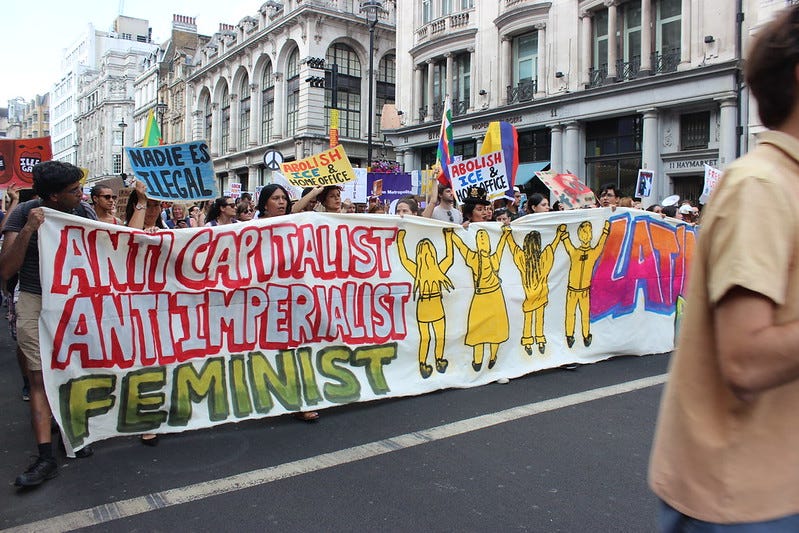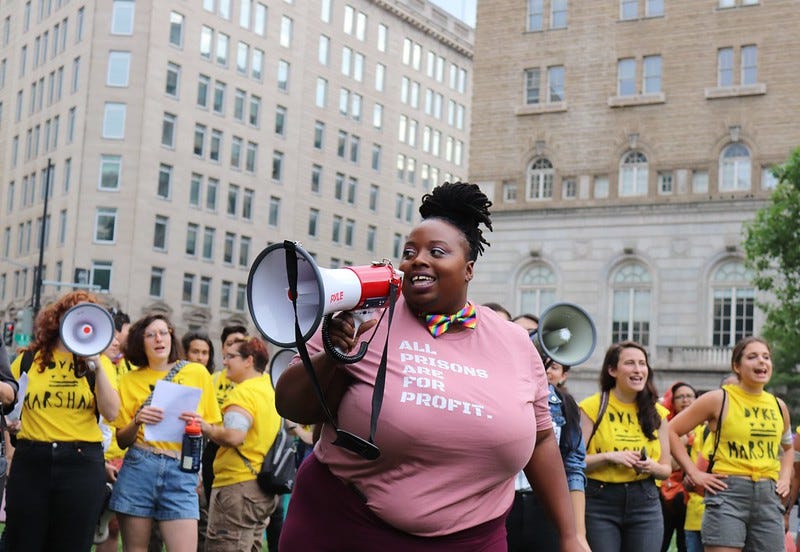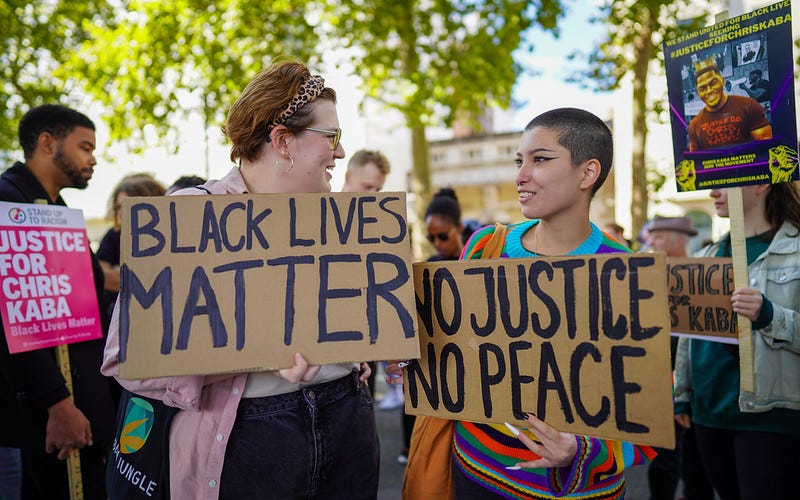Efficiency? Wealth-Creation? These Defenses Of Capitalism No Longer Work
The Oppression Thesis and the future of free enterprise
The following is adapted from a speech Dr. David C. Rose gave in March, dedicating the new Robert W. Plaster College of Business at Thomas More University in Kentucky.
There are many different kinds of cancer, but they are all driven by rampaging cell reproduction. In the West, there is a rampaging idea that connects most of the nonsense that we associate with growing societal dysfunction. What is this big, connecting, carcinogenic idea?
I call it the oppression thesis. It permeates teaching in every subject at all levels and corrupts our culture and institutions in many ways. Saving our glorious experiment in liberty requires treating it like an oncologist would treat a malignant tumor.
Self-declared anti-capitalist anti-imperialist feminist Latinx protesters against Trump (and ICE?) in London in 2018. Maggie Jones/Flickr.
The oppression thesis contends that the rise of the West and America is largely the story of the rise of ever more effective oppression of the weak by the strong. This oppression is now so deeply embedded in our culture and institutions that we are largely unaware of it.
This is why we now have armies of activists to help both the oppressed and the oppressors self-identify, so the former can know to demand their just deserts and the latter can know they are morally required to provide them.
Think about all the ideas floating around today that are unraveling our way of life. The oppression thesis stitches nearly all of them together, producing internal consistency that enchants minds, especially young ones.
The oppression thesis is at its heart about power. If all politics and social interactions are about who oppresses whom, then it is all about who has the power to do so. This is the central idea of critical theory and, as a subset, critical race theory.
But it is utter nonsense. For a society to keep getting richer per person like ours has for over two centuries, it must increase the amount of stuff per person. This won’t happen if all we do is steal each other’s chickens because at the end of the day we’ll still have the same number of people and the same number of chickens.
The oppression thesis certainly can’t explain people like Robert Plaster, who occasions this event today. He was a self-made billionaire, but his wealth was not the product of oppression. His hard work and courage created it.
On its face, the oppression thesis is so spectacularly stupid that I feel talking about it wastes your time, and yet it has already moved mountains and we seem powerless to stop it.
A “DC Dyke March” protester says “all prisons are for profits.” Elvert Barnes/Flickr.
So what does this have to do with morality and the free enterprise system?
Progressives understand that running a society requires controlling it. The problem is that if most people in society are already happy, they won’t be interested in letting you do that.
So progressive’s first order of business was to discredit the free enterprise system that makes us all so happy. They naturally began with Marxist materialist arguments, but those have worked so poorly that they’ve largely been abandoned.
Progressives now argue that the free enterprise system has got to go because it’s immoral. It’s a grand deal with the devil, but we are so blinded by the goodies that the injustice of it all is too hard for most people to see.
That’s where the oppression thesis enters in. It convinces those with power and riches that both necessarily came from immoral oppression, so they should feel guilty enough to simply give up some of both without a fight.
It’s essential that every person who believes in the free enterprise system take note of this shift in strategy. Otherwise you’ll keep arguing that the free enterprise system is better because it’s more efficient. But that’s a rebuttal to an argument that is no longer being made.
Today, if you try to convince a young adult that destroying the free enterprise system will make him poorer and less free, he just self-righteously intones “if that’s the price of social justice, then poorer and less free we shall be.”
So progressives now have a powerful moral argument against our way of life, and we rebut it with efficiency arguments. They tell our children that we rearrange deck chairs while they steer the Titanic away from the icebergs of social injustice.
If we keep doing what we’ve been doing, we’ll keep getting more of the same result, which is ever greater corruption of our way of life. To stop making the same mistakes, we first need to recognize that no efficiency argument has ever beaten a moral one, and none ever will. This is almost true by definition. If someone says he is morally compelled to do or not do something, he’s basically told you that further discussion will be a total waste of your time.
That’s all rather bleak. Is there anything we can do?
We can start by showing up at the right battlefield–the moral battlefield and not the efficiency battlefield. This doesn’t mean that efficiency doesn’t matter. It means that efficiency must be understood as a means to the end of a superior moral result.
More generally, we need to combat their misguided moral case against the free enterprise system with our superior moral case for it–one that happens to be right, compelling, and to have its own connecting idea.
British protesters combine BLM with threats of riot at a protest for a man shot by police. Alisdare Hickson/Flickr.
I call that connecting idea “the cooperation thesis.” It contends that the rise of the West and America is largely the story of ever-more effective cooperation being catalyzed by ever better market systems filled with ever-freer people. The name we give to this unfathomably complex exercise of cooperation is the free enterprise system.
Making a persuasive moral case for the free enterprise system begins with the idea of cooperation. Luckily, cooperation is as simple as it is powerful.
Alone I make ten, alone you make ten, but when we cooperate, we make twenty-six. Not twenty, but twenty-six. It’s the expectation of these extra units, the difference between the value of the whole and the value of the sum of the parts, that induces people to freely choose to cooperate in the first place. We call this the cooperative surplus.
Without the expectation of a cooperative surplus, we would not cooperate because there would be no point. Billions of words have been written about cooperation, most at least partly true, but none are relevant without cooperative surplus.
Because of the cooperative surplus, we have extra units to divide among us. You and I go from consuming ten to consuming thirteen. This is truly win-win. Being mutually beneficial we have every reason to do it freely.
Cooperating therefore cultivates free thinking minds that ultimately foster a general condition of liberty, while making all of us richer at the same time. This is the first step to mass human flourishing.
Since in a free society like ours cooperation normally occurs through voluntary transactions, power is not very important in explaining how people cooperate, but efficiency in the sense of creating value is.
Economic forces directing resource flows in response to seeking efficiency are consistent with freely undertaken and therefore efficient cooperation. But political forces directing resource flows in response to seeking control are consistent with coercion made possible through the exercise of power. No wonder children who’ve been taught critical theory and critical race theory from kindergarten view the world in such zero-sum terms.
America is such a great place in large part because we are very good cooperators. We cooperate so frequently and so naturally that to us it’s like water to fish. Unfortunately fish are the last to discover water, and just fish take it for granted we take our cooperative society (and all that it makes possible) for granted.
A protest in England against neo-colonialism. Alisdare Hickson/Flickr.
Our free enterprise system thrives on specialization for reasons Adam Smith laid out. This means it has a bewildering number of moving parts, which makes it hard to see how cooperation is the animating force behind it all.
But there is a way forward. At the center of it all are firms. In the West today, most cooperation takes place in firms. It’s what they do. It’s why they exist.
But how can that be? Cooperation is obviously good, but firms selfishly maximize profit. Isn’t that why many business ethics scholars argue that firms should pursue non-profit goals, too, in a kind of pay-as-you-go penance scheme?
It turns out there is no contradiction between cooperation and profit maximization.
Maximizing profit is maximizing revenues minus costs, by definition. Ask any accountant or economist. But maximizing revenues minus costs is the same thing as maximizing the value of the final whole minus the value of the sum of the parts that made the whole. Maximizing profit is the same thing as maximizing cooperative surplus.
That is a very important thing to recognize, remember, and repeat to others.
But is it not still true that firms might do wrong things to make more profit? Sure it is! But where’s the news in that? Each of you might do wrong things to maximize your utility. So should you not maximize your utility?
Before you instinctively say “actually, maximizing utility does sound a little selfish, so perhaps not,” know that the welfare of others can be variables in your utility function, so the way you maximize your utility is, in part, to maximize the welfare of others. Deriving happiness from promoting the welfare of others is the antithesis of selfishness.
So the problem isn’t the objective; the problem is doing wrong things to achieve the objective. But we don’t ban basketball because if players really want to win they might be tempted to cheat; we ban cheating.
Firms trying to maximize profit are doing what needs to be done to cooperate as effectively as possible, as long as they don’t do wrong things as a means to that end. They are doing what an omniscient and benevolent social dictator would want done to best promote the common good.
But here’s a simpler way to see why it is a good thing. It is by piling up the cooperative surpluses of cooperative activity that we increase output per person.
That’s not a story progressives want told.
Progressives also understand that firms are at the center of the free enterprise system. So they argue that profit maximization is immoral, so firms are immoral, so the free enterprise system (which is comprised of firms) is therefore also immoral.
This is why almost every new idea in business ethics since the early ‘80s has been contrary to the idea that firms and profit maximization are good for society.
So how should business ethics be taught?
It should start by recognizing that firms are, at their core, nodes of cooperation that automatically promote the common good unless they do wrong things along the way.
This is easy to see if you begin at the beginning, by thinking carefully about how simple forms of cooperation from our distant past evolved into firms we now have. I have provided an account of how this happened in a way that improved the welfare of everyone involved at each step, culminating in the firms we now take for granted. This exercise makes it impossible to fail to see that what modern firms ultimately do is facilitate the most efficient cooperation the world has ever known.
So how should business ethics be taught to ensure that people in firms don’t do wrong things along the way to take firms, which are inherently good, and turn them into something bad?
And how should business ethics be taught to ensure that people in firms cooperate most effectively since, after all, that’s what makes firms good?
Well, if those who own, manage, and work in firms have moral beliefs that stress not doing the moral don’ts above all else, then firms won’t pollute, commit fraud, discriminate on the basis of race or sex, and so on.
Protestors in Minneapolis. Jenny Salita/Flickr.
But this also makes it impossible to behave in untrustworthy ways, so it’s rational to presume that everyone can be trusted, so a high trust environment emerges.
This is no small thing. It’s the key to unleashing cooperation’s awesome power. Untrustworthy behavior kills cooperation. You’ve known this since you were a small child. Trust, however, nourishes it.
Trust is also the key to unlocking creativity. We can be individually creative, of course, but some problems are too difficult for one brain alone to solve, and some creations are too difficult for one brain alone to achieve.
So the key to doing truly great things is for individuals to be able to completely trust each other so they can share each other’s minds to be better creators.
Creativity unleashed by trust is also the driving force of another important topic in business education: entrepreneurship.
Entrepreneurs like Mr. Plaster, who made this extraordinary academic center possible, are creators above all else. They create firms, jobs, better ways of making things, and even entirely new things altogether. If it’s the bounty of entrepreneurial creativity you want, it’s trustworthy people you need.
So what’s the big lesson here? Trust is the key, but this trust must come from individuals being trustworthy. This is only achieved when individuals’ moral beliefs emphasize not doing the moral don’ts; otherwise it will be too easy to engage in greater good rationalizations whereby people convince themselves that doing a wrong thing is justified if it makes doing a good thing possible.
When a society does a well at inculcating these kinds of moral beliefs, firms do a good job maximizing the practical value of cooperation to the benefit. Societies fail in this regard by either not having firms, or having firms that fall far short of what we’ve come to take for granted. Evidence of that today is all around us.
As our moral and cultural institutions continue to wane, our firms continue to reflect the wages of the low-trust society. To throw out firms that made the good life possible for so many instead of attacking the root of the problem is to punish the victim while rewarding the criminal.
The idea of having moral beliefs that put not doing the moral don’ts above all else is so important that I have given it a name: duty-based moral restraint. It’s one thing to think you shouldn’t do the moral don’ts. It’s quite another to believe that you have a moral duty to never do the moral don’ts–not even if by doing so you can do tremendous good.
People who possess an ethic of duty-based moral restraint can be trusted in the widest possible set of circumstances because it cuts them off from all possible means of being untrustworthy.
Duty-based moral restraint is not just a particular moral value, and it’s not just another exhortation to try harder to do the right thing: it organizes moral thinking in a particular way, and changes how we think about morality.
The cultural instantiation of duty-based moral restraint creates a habit of mind of never even considering doing the don’ts. This creates people you can trust completely without having to believe they much care about you. This is the only path to large group trust because such trust requires being able to trust strangers.
Our hardwired foundation for trustworthiness is harm-based moral restraint. Most humans throughout most of human history could be trusted in most circumstances because their genes made them reluctant to harm others. This is a lovely thing.
But it’s not enough. In large firms, the harm caused by a particular untrustworthy act is often divided over so many people that no specific individual is noticeably harmed, so we have no one to feel guilty about having harmed.
Duty-based moral restraint overcomes this because it attaches feelings of guilt directly to wrong actions. So while it’s true that no one on earth is perceptibly harmed by your cheating on your taxes, since you believe lying is wrong in itself, you know you’ll feel guilty if you do it. So you don’t do it.
Because duty-based moral restraint makes people expect to feel so guilty about doing the moral don’ts, they never do them. Eventually their brains stop wasting resources thinking about doing the don’ts because the answer is always no.
Most of you here today are like this. Over the last week you had dozens of opportunities to cheat those around you–many with no chance of being caught. But you didn’t act on any of them. Does that mean you are dumb or irrational? Not at all.
The truth is that behaving like that never even crossed your mind. As you grew up, new neural pathways emerged to circumvent the rational consideration of opportunism to take you directly to the answer “no.” Being tempted therefore does not even bubble up to your conscious mind.
A fiery riot in Denmark. Jospeee P/Flickr.
Long ago duty-based moral restraint became a part of your moral character; a deep part of who you are. And since it’s completely internalized it works even when there is no chance of detection, and no prospect for punishment or reward.
But that didn’t just happen: it resulted from a great deal of hard work by the adults in your life to construct your moral character when you were a child.
This hard work was an act of sacrifice. The adults who constructed your moral character knew that it would benefit you and others in your generation, not them.
So people like you have culturally ingrained moral habits of mind that make you unconditionally trustworthy people. People like you are therefore great cooperators. People like you are the secret ingredient for having the kind of firms that fuel great societies.
Wall Street. Esteban Chiner/Flickr.
Does this mean that the moral dos are not important? Not at all: they are every bit as important as the moral don’ts, just like food is every bit as important as water.
But we all know which is first among these two equals. You die from thirst before you die from hunger.
The real lesson here is not that the moral don’ts rock and the moral dos don’t. The real lesson is an echo of Ecclesiastes 3. Everything has its place. Not doing the don’ts occupies a place in line clearly ahead of doing the moral dos.
Otherwise we go down the path of endless greater good rationalizations that make trust outside those closest to us impossible, so the high trust society is impossible.
A subtle but very important feature of duty-based moral restraint is that it’s able to provide a meaningful standard for moral behavior. It requires inaction, which does not use up resources, so it’s something we can all abide by while expecting everyone else to do so as well.
In contrast, duty-based moral advocacy—unconditional exhortations to do moral dos—cannot provide a basis for meaningful moral standards for behavior.
This is because they require action which requires resources, but we have very different resource constraints. Elon Musk can give every poor person he sees $10 but I can’t. Saying that this simply means there should be different standards for someone like Musk means that a true moral standard does not, in fact, exist.
Here’s another example of everything having its place. Firms should be where we cooperate to make stuff. The more we make, the more we have to spend on ourselves, our families, and on charitable causes.
So doing good is important but it has its place, which is not in the firm but in the personal decisions of those who benefit from the firm. The key to having the most charitable society is having the most effective cooperation by having the most effective firms, one’s whose eyes are trained on profit maximization. Just look at American economic history for all the evidence you could ever need.
To the untrained ear duty-based moral restraint doesn’t sound like it requires very much of people. But sometimes doing nothing is very hard, like not acting on a powerful temptation. Not having to use up resources is not the same thing as not being costly
A new business ethics is needed: one that shows how modern firms evolved from simple cooperation; one that recognizes maximizing profit as another way of saying maximizing cooperative surplus and therefore the practical value of cooperation itself; one that makes clear that an ethic of duty-based moral restraint is the key to unlocking the power of creative cooperation by making trust possible.
Businessmen in New York City. Billie Grace Ward/Flickr.
Many more students are exposed to ethics through business ethics than through philosophy courses. It follows directly that business school education is the key to reversing the harm done by the oppression thesis. Your being here today puts you right in the middle of this fight for the American experiment.
We’ve covered a lot of territory so let’s make sure we don’t lose the forest for the trees with five concluding statements.
1. Cooperation is the secret to the good life. In free enterprise systems like ours, we do most of our cooperating within firms.
2. Maximizing profit within ethical conduct’s guardrails maximizes cooperation.
3. Duty-based moral restraint is the key to it all. It provides objective standards for moral behavior that make it possible for us to trust each other.
4. The oppression thesis is wrong. It creates a zero-sum view of the world that stokes pessimism, distrust, and tribalism. It brings out the worst in us.
5. The cooperation thesis is right. It creates a positive-sum view of the world that stokes optimism, trust, and combats tribalism. It brings out the best in us.
But if all this is true, then what explains the explosion of antipathy toward profit maximization in business ethics through stakeholder theory and the doctrine of corporate social responsibility? Shouldn’t such firms be driven to bankruptcy?
The answer is yes unless they all shifted away from profit maximization at the same time. That is precisely what happened.
My hope, and Mr. Plaster’s hope, I presume, is that this business school will be remembered for having helped lead a great reawakening in business education.
Dr. David C. Rose is a senior fellow at Common Sense Society and a professor of economics at the University of Missouri-St. Louis. His book, The Moral Foundation of Economic Behavior, was selected as one of CHOICE’s outstanding titles of 2012 and was nominated for the Hayek Book Prize.












